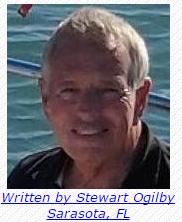SARASOTA, FLORIDA – January 19, 2009 was another gorgeous day here in our semi-tropical paradise with an azure blue sky and temperatures hovering above 70 degrees. A half-block line of walkers, some carrying hand lettered signs bearing messages including “Free Gaza”, “Free Palestine”, and “Out of Iraq Now!” proceeded down Main Street’s sidewalk. A couple of women in white Middle Eastern garb shared a large sign reading “We are all Palestinians!” At the head of this procession walked a tall young man in black church vestments, the assistant pastor of a local church. Beside him walked a woman who identified herself as a pastor at the nearby Lakewood Ranch community. It was all very peaceful. I ambled up, introduced myself, and asked if I could ask them a few questions.
Bearing witness is, of course, making a statement. Certainly, a peaceful demonstration is appropriate for persons desirous of imparting the peace message. The local preacher was quick to disclaim any political bent. By his admission, his action proceeds from a position of faith, not politics. Be that as it may, I recognized a married couple in the line of marchers – strollers would be a better word – persons I know to be politically inclined. The wife was carrying an infant in her arms. They looked happy and peaceful on this clear peaceful sunny afternoon.
A few car horns honked, signifying the drivers’ approval, I assumed. Perhaps the honks represented disapproval. There were not enough honks to disturb the peace. I will not say that there was no sign bearing the familiar peace symbol. I don’t recall seeing one. I thought back forty-three years, despite the absence of that symbol which evoked ridicule and hatred until late in the Vietnam War era. It looked to me as if only a handful of participants in this peaceful parade had been on this planet forty years or more. It looked like 1965 again.
In 1965, early in the Vietnam War era, A. J. Muste led a march of fifty-thousand persons down Fifth Avenue in NYC. It was very peaceful. Fifty thousand peaceful souls bearing witness to their hopes for peace did nothing substantial to turn the tide of events occurring in S.E. Asia. A flood of horrors followed. Thanks to propaganda, “peace” became a dirty word back home.
I met and spoke with Muste at a pacifist rally in Sheridan Square when I was living in Greenwich Village in 1957. Muste, born in 1885, was an ardent and absolute pacifist. An admirer of Gandhi, in 1940 he published his Non-Violence in an Aggressive World – A Christian pacifist approach to revolution in a war-torn world. Muste’s advocacy for peace came, in large measure, from religious roots. He died in 1967, a year too soon to see peaceful demonstrations turn into violent protests. A “police riot” in Chicago during the 1968 Democratic Party convention was a harbinger of the mayhem of 1970.
I commuted from my parents' farm in Hudson, Ohio to Kent State University for my freshman year before transferring to Ohio State University. When at Ohio State in the 1950’s I worked weekends at an old-style drug-store soda fountain located in Cole’s Pharmacy at Beechwold, a northern suburb of Columbus, Ohio. I chatted every Sunday with a young man, Jim Rhodes, Ohio State Auditor, for whom I saved a Sunday newspaper. Jim invariably bought a couple of cigars before settling down at the counter to scan the paper and to enjoy his cigar. I recall how interesting it was at the time for me to discover how a rustic and marginal guy could plan a career in state government.
In April, 1970 Governor Jim Rhodes ordered the armed Ohio National Guard onto the campus of Kent State during a spontaneous protest sparked by President Nixon‘s invasion of Cambodia. Thirteen students, some walking between classes and in the wrong place at the wrong time, were shot and four died. A majority of patriotic Americans polled felt, at the time, that the students “had it coming to them”.
It was another five years before the Vietnam War ended. Funding for the war (so-called "aid to South Vietnam") was finally shut off by Congress. Previous funds had facilitated the murders of more than a million Vietnamese, men, women and children. These funds had financed dropping more tons of explosives on their tiny country than had been dropped by the U.S. in all of the Second World War. More than fifty thousand young Americans died in a war that had lasted more than twice as long as WWII (1941-1945), had never been declared by Congress and that could hardly be termed "defensive".
Peace may pass all understanding. However, members of Congress, apprehensive of returning to their homes from the seat of power, had no trouble understanding violence ("militant protest") when it erupted in their own home towns. They surprised President Gerald Ford in 1975 by denying his last-minute request to increase further "aid" to South Vietnam.
It took a decade then (1965 - 1975). Hopefully, it won’t take a decade again.












